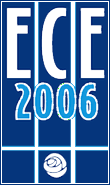|
 European Congress of Endocrinology European Congress of Endocrinology
Media Release
EMBARGO: 00:01 (UK time) Monday 3rd April.
Newly discovered testosterone action may act on prostate cancer
A newly-discovered mode of action of testosterone is showing great promise in defining novel strategies for the development of drugs against prostate cancer.
Testosterone has been associated with a higher rate of certain cancers. Classically, testosterone passes through the cell membrane to act inside the cell. However recent work has indicated that testosterone may also act at the cell surface, through membrane androgen binding sites called Ambs.
Now a team lead by Professors Stournaras, Castanas and Gravanis at the Medical School of the University of Crete Heraklion, Greece) has discovered that activating these cell-surface testosterone binding sites can significantly reduce the size of prostate cancer tumours in animal models.
When testosterone is bound to another protein such as BSA, it does not enter the cell, and so can only be expressed at the cell membrane, activating newly identified specific signalling pathways. The University of Crete team treated mice, which had been given prostate cancer through inoculation with LNCaP cancer cells. They found that after one month of treatment with testosterone bound to the protein BSA (Bovine Serum Albumin) there was a 60% reduction in tumour size, with no apparent side-effects.
Professor Stournaras said
This work strongly supports the concept that testosterone-protein conjugates, which activate membrane androgen receptors may represent a new class of experimental anti-tumour agents in prostate cancer. This is a new concept, and we need to make sure that these results can be transferred to humans in a satisfactory way. But if we can develop drugs that act safely on these Ambs (androgen membrane binding sites) then we may have a completely new therapeutic option for prostate cancer.
Notes
Professor Christos Stournaras will present a talk entitled Activation of androgen membrane binding sites induce potent regression of prostate cancer cells in vitro and in vivo at the European Congress of Endocrinology in Glasgow on Sunday 2nd April 2006. The abstract is available at:
http://www.endocrine-abstracts.org/ea/0011/ea0011oc6.htm
Activation of androgen membrane binding sites induce potent regression of prostate cancer cells in vitro and in vivo
N Papadopoulou1, M Kampa2, A Gravanis3, E Castanas2 & C Stournaras1
1Department of Biochemistry, University of Crete Medical School, Heraklion, Voutes, Greece , 2Department of Experimental Endocrinology University of Crete Medical School, Heraklion, Voutes, Greece , 3Department of Pharmacology University of Crete Medical School, Heraklion, Voutes, Greece.
The European Congress of Endocrinology takes place at the SECC in Glasgow from 1-5 April, 2006. This will be the biggest hormone conference in Europe in 2006, with 2200 delegates and almost1200 pieces of original research.
For more information please contact Tom Parkhill or Jo Thurston at the Society for Endocrinology:
Telephone: +44 (0)1454 642230, or during the conference call +44 (0)7971 691 774
PLEASE MENTION THE EUROPEAN CONGRESS OF ENDOCRINOLOGY IN ANY STORY |
